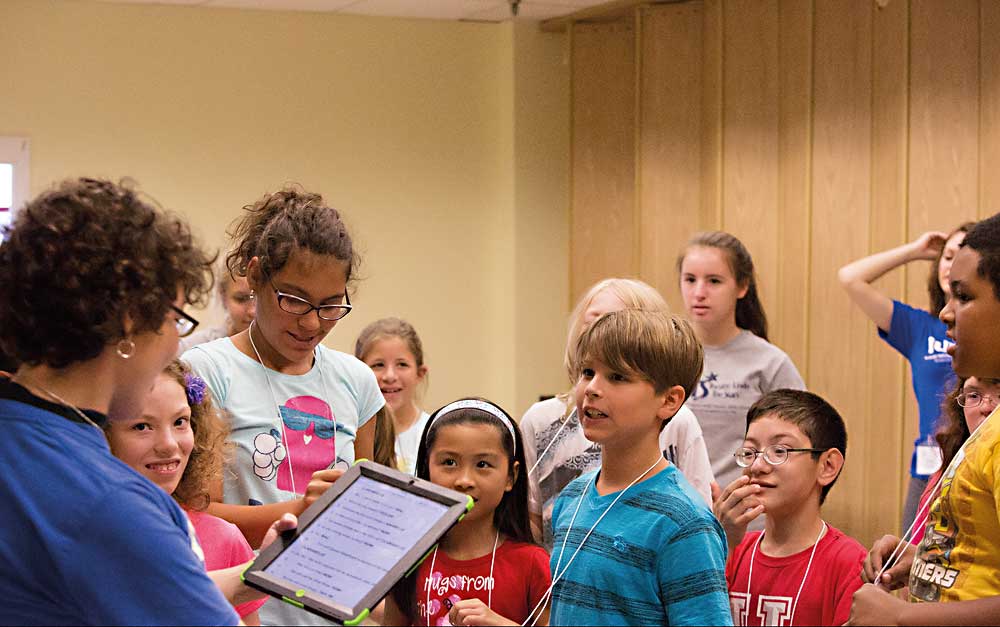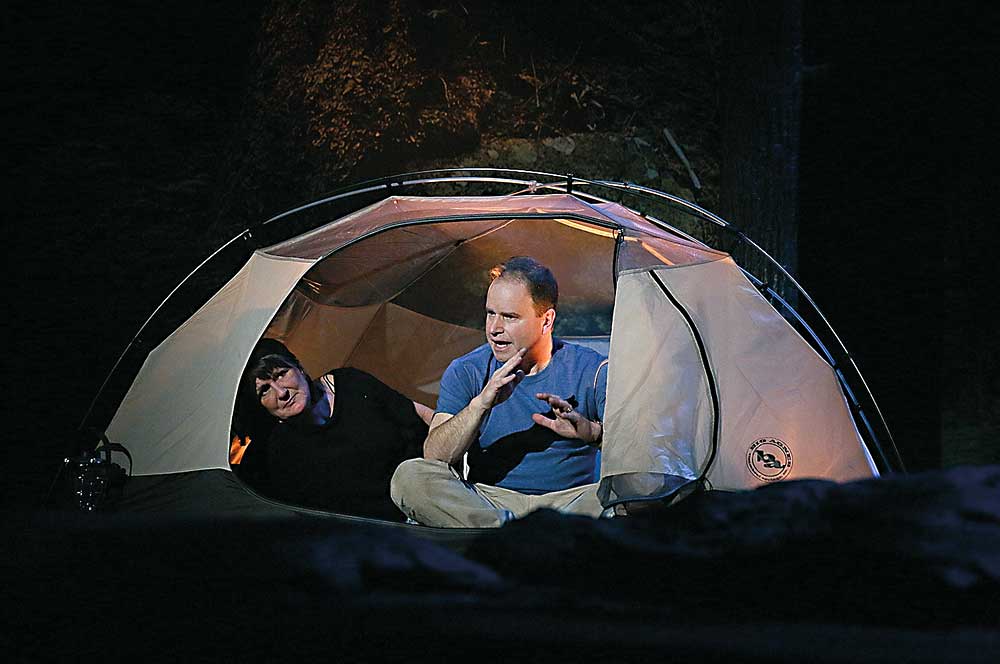
HOUSTON: Portable devices aren’t just for streaming Netflix anymore. Theatre Under the Stars, which specializes in open-air musical theatre productions, is using iPads to teach theatre to its students. The devices made their debut this past summer at the River, a program in TUTS’s education department that provides arts education for individuals with disabilities ages 4–19.
With the help of a $5,000 grant from the United Way of Greater Houston’s 2013 Community Building Grant Program, TUTS was able to integrate eight iPads into its classrooms, providing instructors with additional teaching tools. The new initiative just wrapped up its beta stage during TUTS’s six-week summer musical-theatre camps, which serviced around 300 local youths.
“For many of these students, who struggle with communication, the iPads are an easier way to understand and an easier way to communicate,” says Bob Lawson, TUTS’s director of education. The various teaching apps, such as Text to Speech, help nonverbal students speak their lines by writing them into the iPad, with the device serving as their voice, he explains.
Other teaching opportunities provided by the iPads include the ability to record songs, choreography and lines so that students do not need to rely on just one or two run-throughs in order to learn a routine or a monologue. They can also take those recordings home.
In the fall, TUTS will take the iPads into local elementary schools. “The iPad is an amazing device to enhance their communication and enhance the way they learn,” says Lawson. This is one case where iDevices might be entirely welcome in the theatre. Visit www.tuts.com.

WASHINGTON, D.C.: The increasingly chilly geopolitical relationship between the U.S. and Russia is giving some people Cold War flashbacks—and so may the recent cancellation of an ambitious festival of Russian work at Woolly Mammoth Theatre Company. The plan was to have four hand-picked productions travel to D.C. from Moscow, in a “capital-to-capital concept,” representing what Woolly artistic director Howard Shalwitz called some of the “most provocative and adventurous work” from Russia. (Among the plays were Kirill Serebrennikov’s Scumbags, Praktika Theater’s Babushki, Dmitry Krymov’s Katya, Sonya, Polya, Galya, Vera, Olya, Tanya, and Yury Muravitksy’s Papa Leaves, Mama Lies, Grandma Dies.) The festival was planned for Oct. 25–Nov. 9, with support from Philip Arnoult’s Center for International Theatre Development and money from the city of Moscow. “It had been approved by the mayor of Moscow, and the funding was all in place,” says Shalwitz.
But since Russian incursions into the Crimea and Ukraine and increasingly repressive measures been taken by Vladimir Putin’s government, the climate has changed. Shalwitz wasn’t told directly, but says, “My best guess is not that somebody said, ‘You can’t do this,’ but they created a climate where local folks said, ‘Oh, we can’t send the most adventurous companies to the heart of their new archenemy, the U.S.’”
Shalwitz has been an outspoken admirer of the slower play-development models favored by many Eastern European companies, and he fashioned an initiative called “Free the Beast” to “get plays off the assembly line.” Once the festival was cancelled, he says, “I wondered: Is there another way to honor the spirit, the deeper meaning of what this festival was going to be?” The answer was to go deeper on works already slated for the season. So he’s working to build public, audience-building components into developmental workshops for Lisa D’Amour’s Cherokee, Chad Beckim’s Lights Rise on Grace and Robert O’Hara’s Zombie: The American. “These won’t be conventional play readings,” says Shalwitz. “We’re looking at how connectivity, and the community conversation, can start earlier in the life of a project.”
Another conversation Shalwitz hopes he can keep going is his dialogue with Russian theatremakers. But it is likely to be no more than talk as long as their mobility depends on their government’s approval and material support. “What was disappointing was not only not getting to present these shows to our audiences in D.C., but also that, in the current climate, we need this kind of exchange all the more.” Visit www.woollymammoth.net.
NORFOLK, VA.: Subscribers who sign up for Virginia Stage Company’s 2014–15 season can expect the usual price-point savings and seating guarantees, but this year they’ll get something extra. With each membership purchase, they’ll also get ticket vouchers for two other local performing arts organizations: one for the Virginia Opera and one for the Virginia Symphony Orchestra. The deal is reciprocal for each of those companies, too—their subscribers will get a voucher to see a show at Virginia Stage, as well.
“We were looking for some new incentives, ways to attract new members and subscribers,” says Janelle Burchfield, VSC’s marketing director. The idea occurred to the organizations because they’re already part of an arts consortium that uses the same ticketing service, Tessitura. Though they don’t share their proprietary subscriber lists, Burchfield notes that being on the same ticketing service makes such data-sharing easy when a subscriber to one company opts into another via the new voucher deal. “When someone is using their opera voucher, Virginia Opera will be able to see, ‘Oh, this is a Virginia Stage subscriber.’” Burchfield says she expects that when VSC opens its production of Patrick Meyers’s mountain-climbing drama K2, running Sept. 23–Oct. 12, lots of opera and symphony patrons will join the trek. Go to www.vastage.com.


